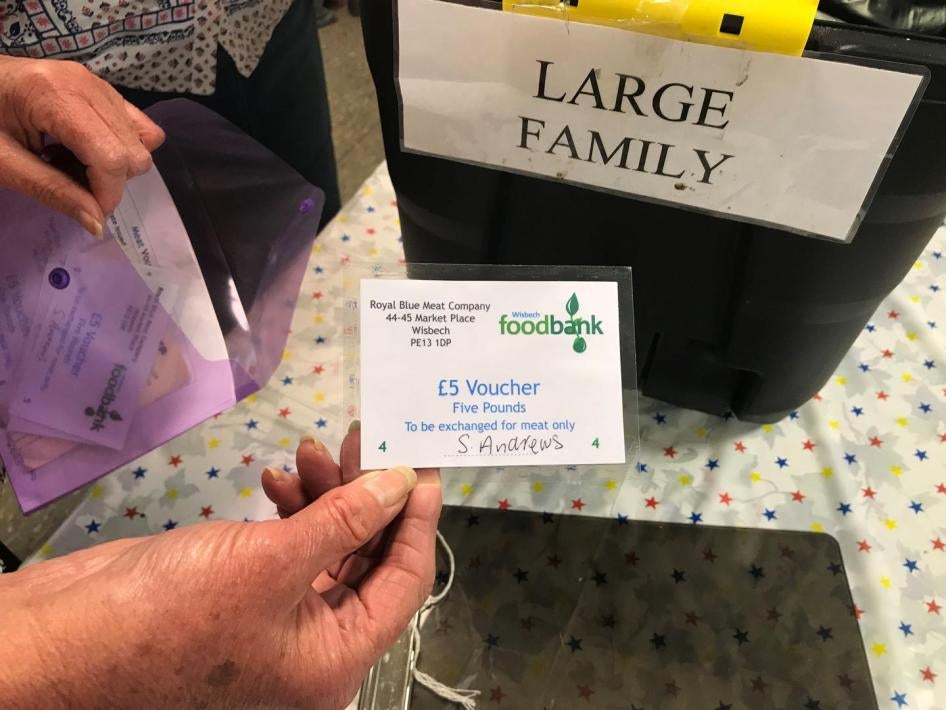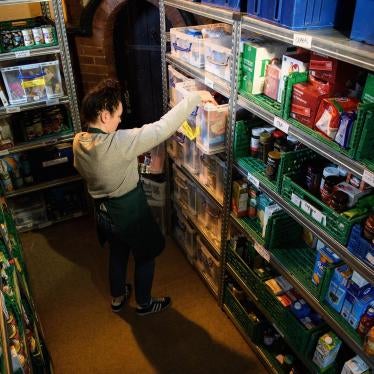(London) — It may only be a couple of hours away by plane, but the grand buildings of the United Nations in Geneva seem a world away from the grinding reality of poverty and deprivation in the UK. Far away from places like the once-prosperous market town of Wisbech in Cambridgeshire or the once-thriving shipyard town of Hull.
I have spent significant parts of the past year speaking to people living on the breadline, struggling to feed their families, or worse, going hungry, in these towns and cities. It was a jarring juxtaposition to navigate the Palais des Nations in Geneva yesterday with colleagues from UK community organizations and other nongovernmental groups.
But something happening this week in Geneva could make a difference to people’s lives in those communities. Today the UN special rapporteur on extreme poverty and human rights, Philip Alston, will formally present his findings from his visit to the UK in November to the United Nations Human Rights Council.
The government’s response has been a depressingly predictable mixture of dismissive denial and outraged complaint about the tone of the report rather than its substance.
Bluster aside, this moment offers a real opportunity for the UK government to be made to change its disdainful attitude, face the mounting facts, and start taking socioeconomic rights seriously.
Earlier this week, Baroness Buscombe, speaking in the House of Lords, captured the government’s attitude perfectly, saying: “We remain disappointed by the overtly political tone of the report […] I have just been at the United Nations in New York […] Time and again, ministers and commissioners—everyone involved with the UN—said that they do not recognize this report.”
I spent yesterday morning at the United Nations, speaking alongside Professor Alston and UK-based activists who played a pivotal role in setting up community forums and town hall meetings for the rapporteur and his team. During their 12-day visit, they crisscrossed the length and breadth of the UK speaking to people in churches, community centers, food banks, and homeless shelters.
Attitudes matter. The UK’s independent financial watchdog, the National Audit Office, has savaged the DWP’s dismissive attitude to evidence of welfare claimants’ difficulties and hardship. Alston’s exercise demonstrates the power of listening to the people who feel left out of decision-making and left behind once the decisions affecting their lives have been made. In my research speaking to people at food banks, many said no one had ever bothered to ask them how they had been affected by changes to welfare. There is a need to shift from a dismissive attitude to one of listening in an engaged manner.
In my work for Human Rights Watch, we spoke with parents who were going hungry to ensure that their children had enough to eat, and teachers and staff at children’s centers telling us about kids arriving at school or nursery hungry. We spoke with mothers in food bank queues who felt like they were failing their children.
The facts matter. A common refrain from the government has been to call into question findings like Alston’s and ours. Government ministers have claimed that Alston’s report is “barely believable” or accuse us all of generalizations.
Yet earlier this month a senior DWP civil servant told a parliamentary committee that the facts in Alston’s report were checked by her colleagues and stood up. It is good the government has committed to measure food insecurity, albeit without the backing of statute. It is good that the government has agreed to adopt a new definition of poverty pioneered by the independent Social Metrics Commission. Government ministers have told us they don’t maintain date on food bank referrals, but they easily could—and should. Data like this would help develop a robust, evidence-based conversation about the human rights impact of welfare cuts.
Rights matter. Human Rights Watch focus group work in the UK has found that people care deeply about the right to a decent standard of living. Having adequate food is an integral part of that right, as is being able to get health care, education and housing. A government genuinely concerned about addressing poverty and deprivation should be willing to treat these as human rights guaranteed in domestic law by promises they have made internationally. People left to go hungry due to government policy should have the right to a remedy.
This moment offers a unique opportunity for UK civil society, parliamentarians, the legal community, and in fact everyone to realize that these issues are matters of their human rights. They should seize the special rapporteur’s findings and hold the UK government to account on its record on poverty and social and economic rights.









